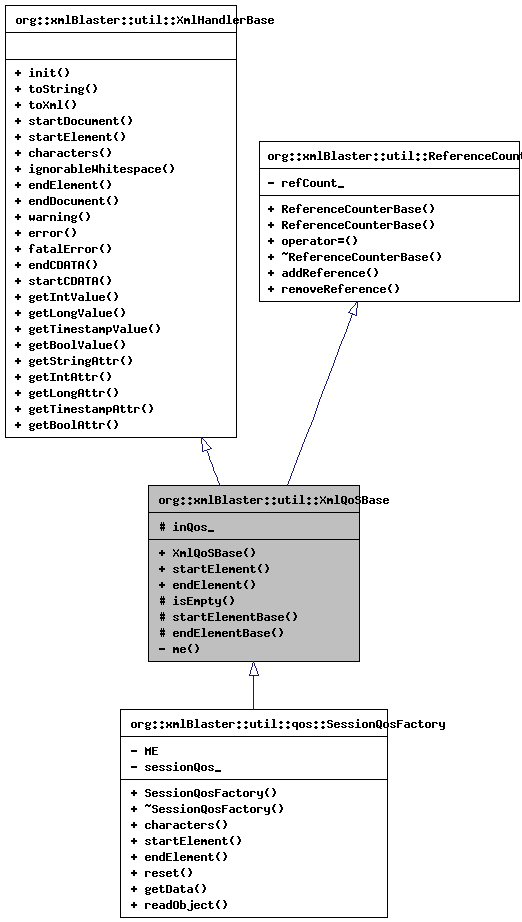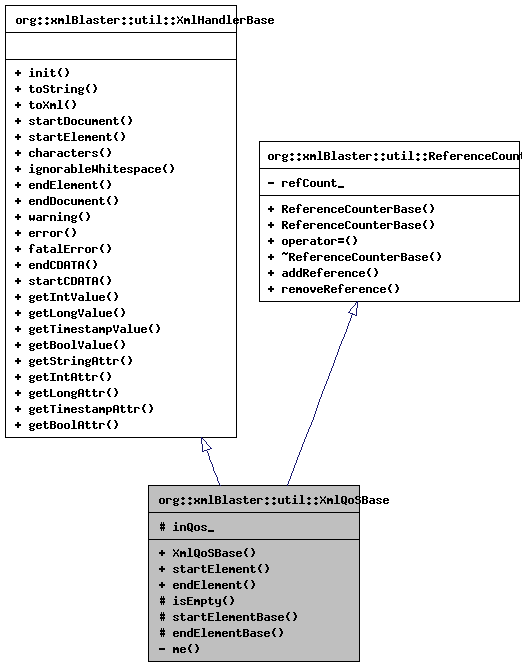

Inheritance diagram for org::xmlBlaster::util::XmlQoSBase:


Public Member Functions | |
| XmlQoSBase (org::xmlBlaster::util::Global &global) | |
| Constructs an un initialized QoS (quality of service) object. | |
| void | startElement (std::string &name, parser::AttributeMap &attrs) |
| Start element. | |
| void | endElement (std::string &name) |
| End element. | |
Protected Member Functions | |
| bool | isEmpty (std::string &qos) |
| To avoid SAX parsing (which costs many CPU cycles) check the QoS std::string here if it contains anything useful. | |
| bool | startElementBase (std::string &name, parser::AttributeMap &) |
| Start element callback, does handling of tag <qos>. | |
| bool | endElementBase (std::string &name) |
| End element callback, does handling of tag <qos>. | |
Protected Attributes | |
| bool | inQos_ |
With XML there are no problems to extend the services of the xmlBlaster in unlimited ways.
The xml std::string is parsed with a SAX parser, since no persistent DOM tree is needed and SAX is much faster.
You may use this as a base class for your specialized QoS.
The <qos> tag is parsed here, and you provide the parsing of the inner tags.
Definition at line 31 of file XmlQoSBase.h.
| org::xmlBlaster::util::XmlQoSBase::XmlQoSBase | ( | org::xmlBlaster::util::Global & | global | ) |
Constructs an un initialized QoS (quality of service) object.
You need to call the init() method to parse the XML std::string.
Definition at line 19 of file XmlQoSBase.cpp.
References inQos_.
| bool org::xmlBlaster::util::XmlQoSBase::isEmpty | ( | std::string & | qos | ) | [protected] |
To avoid SAX parsing (which costs many CPU cycles) check the QoS std::string here if it contains anything useful.
| qos | The literal ASCII xml std::string |
| bool org::xmlBlaster::util::XmlQoSBase::startElementBase | ( | std::string & | name, | |
| parser::AttributeMap & | ||||
| ) | [protected] |
Start element callback, does handling of tag <qos>.
You may include this into your derived startElement() method like this:
if (util::XmlQoSBase::startElementBase(name, attrs)) return;
| void org::xmlBlaster::util::XmlQoSBase::startElement | ( | std::string & | name, | |
| parser::AttributeMap & | attrs | |||
| ) |
Start element.
Default implementation, knows how to parse <qos> but knows nothing about the tags inside of qos
Reimplemented in org::xmlBlaster::util::qos::SessionQosFactory.
| bool org::xmlBlaster::util::XmlQoSBase::endElementBase | ( | std::string & | name | ) | [protected] |
End element callback, does handling of tag <qos>.
You may include this into your derived endElement() method like this:
if (SaxHandlerBase::endElementBase(name) == true)
return;
| void org::xmlBlaster::util::XmlQoSBase::endElement | ( | std::string & | name | ) |
End element.
Default implementation, knows how to parse <qos> but knows nothing about the tags inside of qos
Reimplemented in org::xmlBlaster::util::qos::SessionQosFactory.
bool org::xmlBlaster::util::XmlQoSBase::inQos_ [protected] |